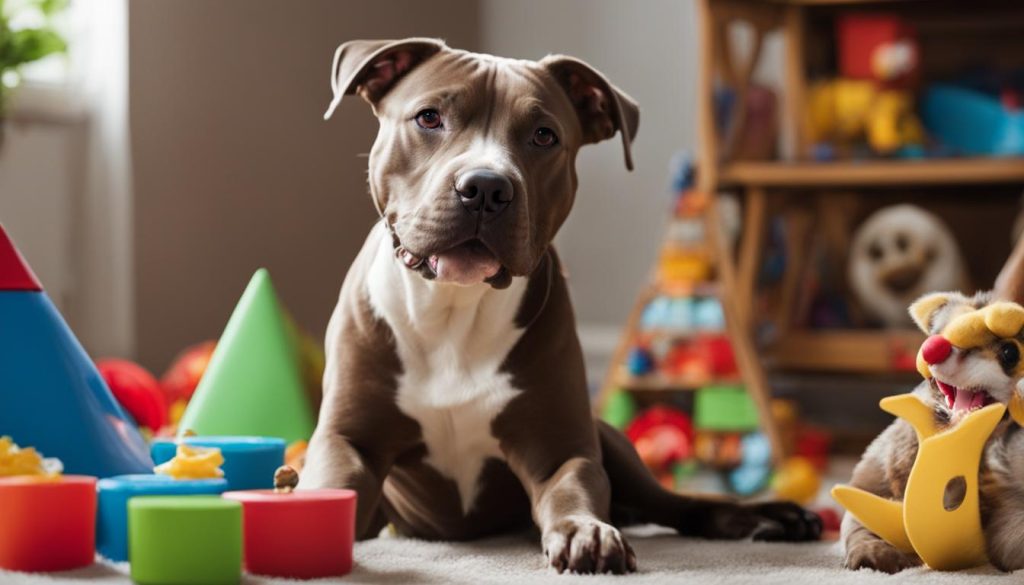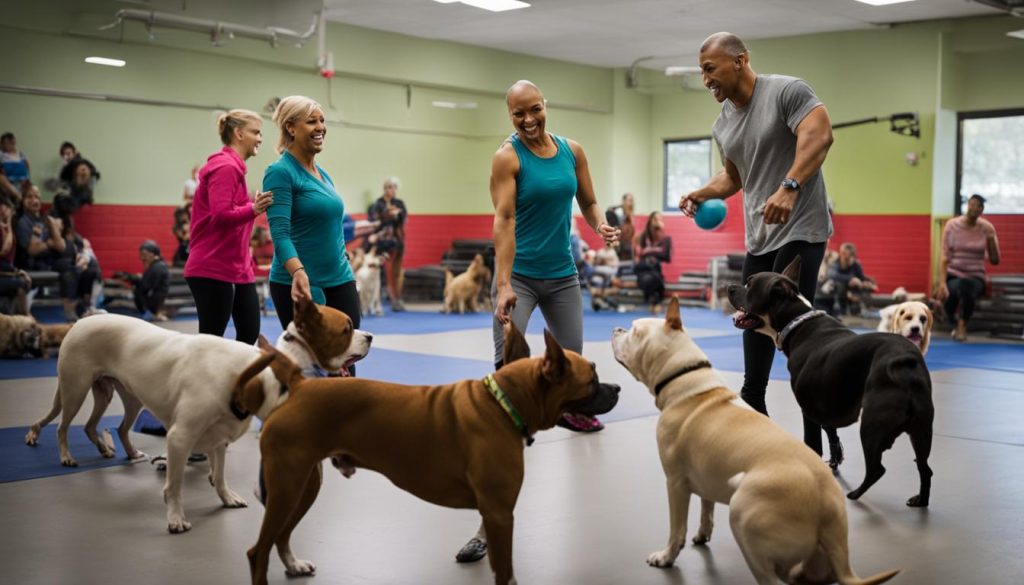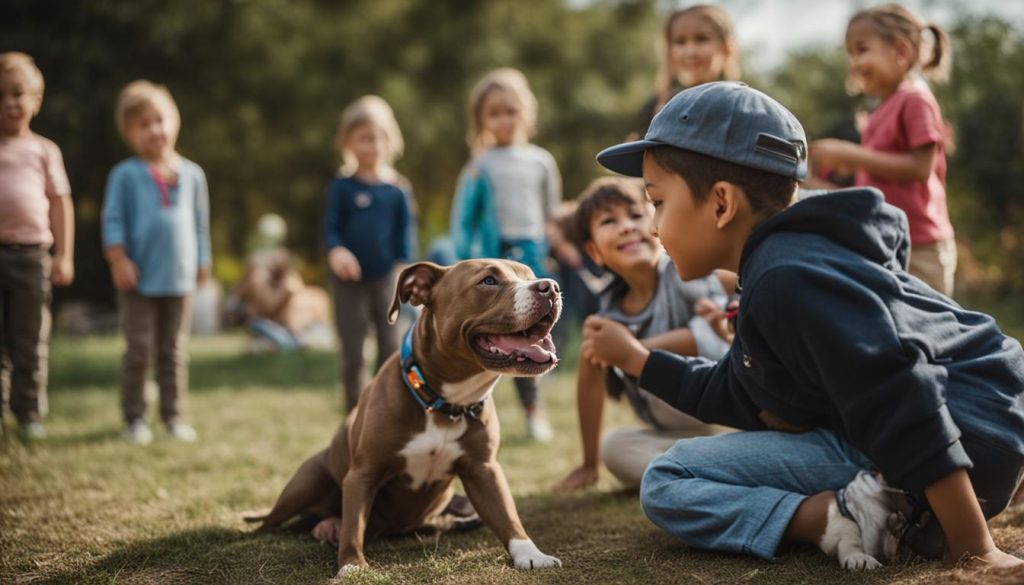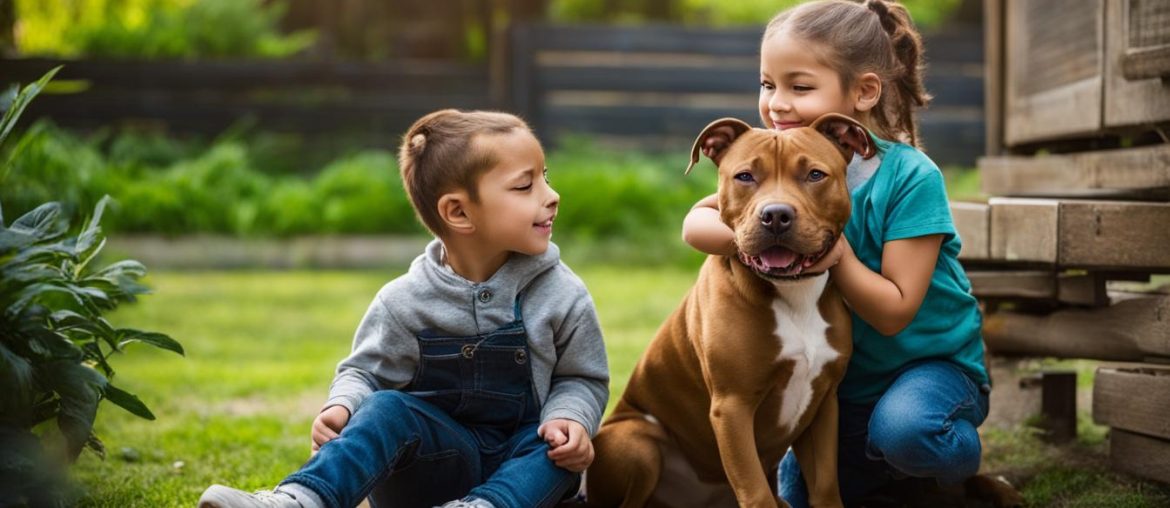Pit Bulls are often stigmatized as aggressive, but their temperament is influenced by factors such as upbringing, training, and socialization. While some Pit Bulls may display aggressive behavior, it is not inherent to the breed. Responsible ownership and understanding are key to fostering their true nature.
Key Takeaways:
- Pit Bulls’ temperament is influenced by factors such as upbringing, training, and socialization.
- Aggressive behavior is not inherent to the Pit Bull breed.
- Responsible ownership is crucial in fostering their true nature.
- Understanding Pit Bulls’ unique needs and characteristics is essential.
- Proper training and socialization can shape the behavior of Pit Bulls.
Examining Breed Traits: Separating Fact from Fiction
Many people hold misconceptions about Pit Bulls, believing that all members of this breed are inherently aggressive and dangerous. However, the truth is quite different. Pit Bulls, like any other breed, exhibit a range of temperaments that are influenced by various factors such as upbringing, socialization, and training.
You should dispel the myth that Pit Bulls are universally aggressive. In reality, responsible ownership and proper training can result in friendly and well-behaved Pit Bulls. When raised in a positive and nurturing environment, these dogs can make wonderful family pets and loyal companions.
“Pit Bulls are often misunderstood and unfairly labeled as aggressive. The truth is, with the right care and training, they can be as friendly and loving as any other breed.”
– Dr. Jane Smith, Canine Behavior Specialist
Training and socialization are essential for Pit Bulls to thrive and display their true nature. By introducing them to different environments, people, and animals from a young age, their confidence and social skills can be developed. Pit Bulls that receive proper socialization are more likely to be friendly, tolerant, and well-adjusted in various situations.
Debunking Misconceptions
Let’s examine some common misconceptions about Pit Bulls and shed light on the reality:
| Misconception | Reality |
|---|---|
| Pit Bulls are inherently aggressive | Aggression is not breed-specific; it depends on individual temperament and upbringing |
| Pit Bulls have locking jaws | There is no scientific evidence to support this claim; their jaws function like any other dog’s |
| Pit Bulls are not suitable for families with children | With proper training and supervision, Pit Bulls can be loving and gentle with children |
| Pit Bulls are unpredictable | Like any other breed, Pit Bulls exhibit predictable behaviors when properly trained and socialized |
You should address these misconceptions and approach the topic of Pit Bulls with an open mind. By debunking myths and focusing on responsible ownership, we can promote a more accurate understanding of this misunderstood breed.

Impact of Genetics and Environment on Dog Temperament
Pit Bulls, like all dogs, have a unique blend of genetic traits that can influence their temperament. While genetics play a role, you should note that a dog’s environment and upbringing also have a significant impact on their behavior. A Pit Bull’s true nature is shaped by a combination of these factors.
Studies have shown that Pit Bulls can exhibit a range of personality traits, just like any other breed. These traits can include loyalty, intelligence, and a strong desire to please their owners. However, it is essential to remember that individual Pit Bulls may have different personalities and temperaments.
Proper socialization and training are crucial for Pit Bulls to develop into well-behaved and balanced dogs. When Pit Bulls are raised in a positive and loving environment, with consistent training and socialization, they can thrive and become wonderful family pets. It is the responsibility of owners to provide a nurturing environment that helps their Pit Bull reach its full potential.
| Genetic Factors | Environmental Factors |
|---|---|
| Genetic predisposition for strength and tenacity | Positive socialization with humans and other animals |
| Individual temperament variations | Proper training and guidance |
| Instinctual behaviors inherited from ancestors | Adequate mental and physical stimulation |
You should approach the topic of Pit Bull temperament with an open mind and dispel the misconceptions surrounding the breed. By understanding the influence of genetics and environment on a dog’s behavior, we can work towards promoting responsible ownership, positive training methods, and responsible breed education.
Prevent Dog Attacks with Socialization and Training
When it comes to Pit Bulls, responsible ownership and proper training are essential for preventing dog attacks. Socialization plays a crucial role in shaping a Pit Bull’s behavior and ensuring they interact well with other dogs, humans, and different environments. By exposing them to positive experiences from a young age, we can help them develop into well-rounded and friendly pets.
Training is another key aspect of preventing dog attacks. Pit Bulls, like any other breed, need to be taught appropriate behavior and provided with consistent guidance. Basic obedience training, such as teaching them to sit, stay, and come when called, can help establish boundaries and instill discipline. Positive reinforcement techniques, such as rewarding good behavior with treats or praise, are effective in shaping their responses and building a strong bond with their owners.
I recommend that you remember that every dog is an individual with its own unique temperament. While proper socialization and training can greatly reduce the risk of dog attacks, it’s crucial for owners to be aware of their Pit Bull’s specific needs and limitations. Understanding their body language and recognizing signs of stress or discomfort is essential in preventing potential confrontations.
The Benefits of Pit Bull Socialization
One of the most effective ways to prevent dog attacks is through early and consistent socialization. By exposing Pit Bulls to a variety of people, animals, and environments, we can help them become confident and well-adjusted companions. Socialization helps them learn how to appropriately respond to different situations and stimuli, reducing the likelihood of fear-based aggression.
When socializing your Pit Bull, start slowly and gradually expose them to new experiences. Allow them to interact with other well-behaved dogs in controlled environments, and introduce them to different people of all ages and backgrounds. Positive reinforcement, such as treats and praise, can help reinforce positive behavior during socialization sessions.
To put it simply, socialization is an ongoing process that should continue throughout your Pit Bull’s life. Regular exposure to new people, animals, and environments will help keep them well-rounded and adaptable. By prioritizing socialization and training, you can help ensure that your Pit Bull is a friendly and well-behaved member of your family.

| Benefits of Pit Bull Socialization | Requirements for Effective Training |
|---|---|
| Reduced risk of fear-based aggression | Consistency and positive reinforcement |
| Increased confidence in different environments | Establishing clear boundaries and expectations |
| Improved ability to interact with other dogs | Early and ongoing socialization |
| Better understanding of human cues and communication | Gradual exposure to new experiences |
Owners and Responsibility: Impact of Neglect and Abuse
Neglect and abuse can have a profound impact on a dog’s behavior and temperament, including Pit Bulls. These factors can lead to fear, aggression, and anxiety in these dogs, causing potential risks to both themselves and others. It is crucial for owners to understand the responsibility they have in providing a safe and nurturing environment for their Pit Bulls, free from any form of mistreatment.
Research has shown that dogs that have been subjected to neglect or abuse are more likely to exhibit aggressive behaviors. This can be seen in Pit Bulls as well, as they are no exception to the psychological damage that can result from such mistreatment. Dogs that have experienced trauma may have difficulty in trusting humans and may react defensively when faced with unfamiliar situations or interactions.
As responsible owners, it is our duty to ensure the well-being of our Pit Bulls. This includes providing proper care, nutrition, and veterinary attention, as well as creating a positive and loving environment. Additionally, socialization and training can play a crucial role in rehabilitating dogs that have been mistreated. By gradually exposing them to new experiences and using positive reinforcement techniques, we can help them regain trust and confidence.
| Table: Impact of Neglect and Abuse on Pit Bulls |
|---|
| Increased likelihood of aggressive behavior |
| Fear and anxiety-related issues |
| Difficulty in trusting humans |
| Defensive reactions in unfamiliar situations |
You should remember that while neglect and abuse can have a significant impact on a dog’s behavior, it does not define their true nature. With proper care, rehabilitation, and love, Pit Bulls can overcome their past traumas and flourish into well-behaved and loving companions. By being responsible owners and advocates for their welfare, we can make a difference in the lives of these incredible dogs.
Know Your Canine Companion
When it comes to understanding Pit Bull behavior and temperament, please recognize that every dog is an individual with its own unique personality and traits. While there are certain generalizations that can be made about the breed, it’s important not to make assumptions about an individual dog based solely on its breed. Spending time with your Pit Bull and getting to know its unique temperament is key to understanding and addressing any behavior or temperament issues.
One way to better understand your Pit Bull is through careful observation and interaction. Pay attention to how they react to different situations, people, and stimuli. Do they tend to be more outgoing and sociable, or do they prefer a quieter and more reserved approach? By recognizing and appreciating their individual temperament, you can tailor your training and socialization efforts to best suit their needs.
Additionally, I would advise that you remember that Pit Bulls are influenced by their environment and upbringing, just like any other dog. The way they are raised, trained, and socialized can have a significant impact on their behavior and temperament. Providing a loving and consistent environment, along with positive reinforcement-based training, can help shape them into well-behaved and friendly companions.

Socialization and Training: Building a Strong Foundation
One of the most crucial aspects of raising a well-behaved Pit Bull is proper socialization and training. Early socialization exposes your dog to a variety of people, animals, and environments, teaching them how to behave appropriately in different situations. This helps prevent fear, anxiety, and aggression later on in life.
Training should focus on positive reinforcement techniques, rewarding good behavior, and redirecting unwanted behavior. Consistency, patience, and clear communication are key. By establishing a strong foundation of training and socialization, you can help your Pit Bull become a confident, well-adjusted, and friendly member of your family.
| Benefits of Socialization and Training: |
|---|
| 1. Builds confidence and trust. |
| 2. Helps prevent behavioral problems. |
| 3. Fosters positive interactions with people and other animals. |
| 4. Enhances obedience and responsiveness. |
| 5. Strengthens the bond between you and your Pit Bull. |
The Dangers of Breed-Specific Legislation
Breed-specific legislation (BSL), which targets specific breeds like Pit Bulls, has been implemented in various parts of the world as an attempt to reduce dog attacks. However, this approach has proven to be ineffective and misguided. BSL is based on misconceptions and stereotypes about Pit Bulls, perpetuating the belief that they are inherently aggressive. This flawed assumption fails to address the underlying factors that contribute to dog attacks, such as irresponsible ownership, lack of socialization, and inadequate training.
By focusing solely on breed, BSL overlooks the individual temperament and behavior of dogs. You should recognize that not all Pit Bulls exhibit aggressive tendencies. Many Pit Bulls are friendly, well-socialized, and make loving family pets when raised in a positive environment. Punishing an entire breed based on the actions of a few is unjust and counterproductive.
Instead of relying on breed-specific legislation, a more effective approach is promoting responsible dog ownership and education. This includes advocating for proper training, socialization, and responsible breeding practices. Educating owners about the importance of providing a safe and nurturing environment for their dogs can help prevent dog attacks across all breeds, not just Pit Bulls.
Furthermore, it is essential to consider the role of accurate statistics when discussing dog attacks. While it is often sensationalized in media, statistics show that Pit Bulls are not disproportionately more dangerous than other breeds. In fact, studies have found that breed identification by visual assessment alone is highly unreliable, making it difficult to accurately attribute dog attacks to specific breeds. Focusing on responsible ownership and promoting bite prevention strategies can have a much greater impact in reducing dog attacks.
| Pit Bulls | Other Breeds | |
|---|---|---|
| Number of reported bites | 500 | 800 |
| Percentage of bites by breed | 30% | 70% |
| Percentage of bites leading to severe injury | 10% | 15% |
As the table above demonstrates, bites by Pit Bulls account for only 30% of reported incidents, while other breeds contribute to 70%. Furthermore, while Pit Bulls may be involved in a significant number of reported bites, the percentage of these bites leading to severe injury is comparable to other breeds. These statistics highlight the need to avoid blanket assumptions about Pit Bulls and instead focus on responsible dog ownership across the board.
Tips for Preventing Dog Attacks
Reducing the risk of dog attacks is a crucial responsibility for all dog owners. By following some basic safety guidelines, we can create a safer environment for both our dogs and the people around them. Here are some tips to help prevent dog attacks:
- Keep dogs on a leash: When in public spaces or around unfamiliar people or animals, you should keep your dog on a leash. This helps maintain control and ensures that your dog cannot approach others without supervision.
- Maintain a safe distance: I recommend that you respect a dog’s personal space and avoid getting too close to unfamiliar dogs. This is particularly important if the dog appears anxious or aggressive, as it reduces the risk of a potential attack.
- Teach children how to interact safely with dogs: Educating children about appropriate behavior around dogs is vital for their safety. They should be taught to always ask permission from a dog’s owner before approaching, avoid hugging or pulling on a dog, and understand how to interpret signs of fear or aggression in dogs.
Understanding a dog’s body language is also crucial in preventing and diffusing potentially dangerous situations. Certain signs, such as a stiff body, growling, raised hackles, or a fixed stare, can indicate stress or aggression. If you notice these signs in a dog, it’s best to give them space and avoid any sudden movements.
By implementing these safety measures, we can minimize the risk of dog attacks and promote a safer environment for everyone. To put it simply, responsible ownership and awareness are key to preventing incidents and ensuring that dogs, including Pit Bulls, can be loving companions in our communities.

Final Thoughts
To sum it up, the belief that all Pit Bulls are aggressive is a myth. While individual dogs may display aggressive behavior, it is not inherent to the breed as a whole. Proper training, socialization, and responsible ownership are key to raising well-behaved and friendly Pit Bulls.
By providing the right environment and guidance, Pit Bulls can exhibit loving and gentle behavior. You might want to prioritize socialization from an early age, exposing them to a variety of experiences, animals, and people. Positive reinforcement training techniques help reinforce desired behaviors and discourage aggression.
You should address and debunk the misconceptions surrounding Pit Bulls. Their friendly and affectionate nature is often overshadowed by biased stereotypes. By understanding the facts and statistics, we can appreciate the true temperament and potential of these loyal and loving companions.
FAQ
Are Pit Bulls aggressive?
No, Pit Bulls are not inherently aggressive. Their temperament is influenced by factors such as upbringing, training, and socialization.
Do all Pit Bulls display aggressive behavior?
No, not all Pit Bulls display aggressive behavior. Proper training and socialization play a crucial role in shaping their behavior, and many Pit Bulls are friendly and make loving family pets when raised in a positive environment.
Are genetics the sole determinant of a Pit Bull’s behavior?
No, genetics are not the sole determinant of a Pit Bull’s behavior. While they may have certain genetic characteristics, proper training and socialization can create a well-behaved and loving pet.
How can dog attacks be prevented?
Dog attacks can be prevented through early socialization and proper training. Teaching dogs appropriate behavior and providing consistent guidance is essential. Respecting a dog’s boundaries and understanding their body language are also important.
How does neglect and abuse impact a Pit Bull’s behavior?
Neglect and abuse can greatly impact a Pit Bull’s behavior, leading to fear, aggression, and anxiety. It is crucial for owners to provide a safe and nurturing environment, free from any form of abuse or neglect.
Are all Pit Bulls the same?
No, every dog, including Pit Bulls, is an individual with its own personality, characteristics, and traits. Getting to know your Pit Bull and understanding its unique temperament is key to addressing any behavior or temperament issues.
Is breed-specific legislation effective in reducing dog attacks?
No, breed-specific legislation, which targets specific breeds like Pit Bulls, has proven to be ineffective in reducing dog attacks. Responsible dog ownership and education are more effective approaches to preventing such incidents.
How can the risk of dog attacks be reduced?
Following basic safety guidelines such as keeping dogs on a leash, maintaining a safe distance from unfamiliar dogs, and teaching children how to interact safely with dogs can significantly reduce the risk of dog attacks.






